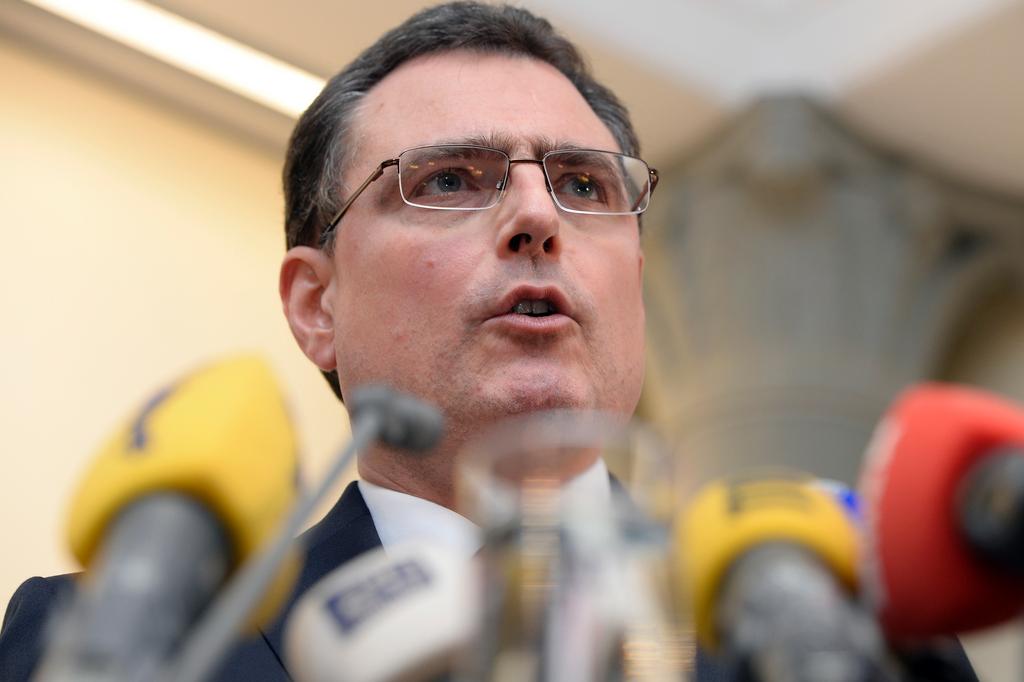
Swiss National Bank scraps exchange rate ceiling

The Swiss National Bank (SNB) has lifted the minimum exchange rate of CHF1.20 per euro, introduced in September 2011. The decision caught markets by surprise and caused the Swiss stock market to plunge.
“This exceptional and temporary measure protected the Swiss economy from serious harm,” the SNB said in a statement on Thursday.
“While the Swiss franc is still high, the overvaluation has decreased as a whole since the introduction of the minimum exchange rate. The economy was able to take advantage of this phase to adjust to the new situation.”
It added that recently, divergences between the monetary policies of the major currency areas have increased significantly – “a trend that is likely to become even more pronounced”.
The cabinet’s economic policy committee, made up of Johann Schneider-Ammann, Eveline Widmer-Schlumpf and Doris Leuthard, said on Thursday the cap on the franc was “an important and good instrument” to allow Swiss businesses certainty in financial planning, but stressed that it had always been “temporary”.
In a statement the ministers said they trusted the national bank, but also commented it was “obvious” that the SNB’s decision “presented major challenges for the Swiss economy, in particular the export and tourism industries”.
The SNB’s announcement led to the Swiss Market Index (SMI) recording its biggest daily percentage fall for 25 years, closing at 8400.61, down 8.7%.
‘Inappropriate tightening’
The euro has depreciated considerably against the US dollar and this, in turn, has caused the Swiss franc to weaken against the US dollar. In these circumstances, the SNB concluded that enforcing and maintaining the minimum exchange rate for the Swiss franc against the euro was no longer justified.

More
Quick guide to what’s happened to the Swiss franc
The SNB said it was lowering interest rates significantly to ensure that discontinuation of the minimum exchange rate would not lead to an “inappropriate tightening of monetary conditions”.
The SNB said it would continue to take account of the exchange rate situation in formulating its monetary policy in future, remaining active in the foreign exchange market to influence monetary conditions “if necessary”.
SNB President Thomas Jordan said the decision had been inevitable. “There’s no point in putting off such a measure indefinitely,” he said at a press conference in Zurich on Thursday afternoon.
Commenting on the general surprise caused by the bank’s decision, Jordan said there had been no alternative. “It was the same when the SNB introduced the currency peg,” he said.
Reaction
Lukas Reimann, an MP for the rightwing Swiss People’s Party called the decision “excellent and overdue”. The party’s prominent vice president, Christoph Blocher said that the export industry had had enough time to prepare for an eventual end to the currency ceiling.
The leftwing Social Democrats wrote in a statement that the SNB had taken an “incomprehensible high-risk decision”, arguing they should accept it could have catastrophic consequences for jobs and the national economy.
Immediate reaction to the unexpected announcement made itself visible; the franc soared by almost 30% in value against the euro in minutes. SNB vice-chairman Jean-Pierre Danthine had said as recently as Monday that the cap would remain the cornerstone of its monetary policy.
Dealers said the SNB’s decision had unnerved investors as it raised the possibility of future unexpected moves by other central banks.
“It’s not every day that a central bank pulls the rug out from underneath something in such a massive way, and clearly people are worried that there’s something bigger afoot. This kind of event is the kind of thing that will trigger volatility. This is not a one-day thing now,” said IG market analyst Chris Beauchamp.
The Swiss markets showed a huge reaction.
I guess Swiss companies are not that happy about the #SNBExternal link right now. #EURCHFExternal link pic.twitter.com/8pkXe6u116External link
— jeroen blokland (@jsblokland) January 15, 2015External link“It has taken the market by complete surprise,” said Jonathan Webb, head of FX (foreign exchange) strategy at Jefferies in London.
“The SNB probably expects the ECB (European Central Bank) to launch QE (quantitative easing) next week and along with the Greek elections coming up it would make it pretty tough on the Swiss to keep bidding the euro. So they have abandoned the cap and cut rates deeper into negative territory. We expect euro/Swiss to trade around 0.90-1.00 francs after all the stop loss orders have been cleared.”
Swiss National Bank decision: Watch Geoffrey Yu, UBS FX strategist, with his and the market's current reaction http://t.co/dBIuDJpULCExternal link #SNBExternal link
— UBS (@UBS) January 15, 2015External link“This is a huge move from the Swiss National Bank,” said Aberdeen Asset Management Investment Manager Luke Bartholomew.
“Switzerland’s problem is that it is almost too credible as a safe haven. People desperately want to hold the currency to shield themselves from the risks they see elsewhere, particularly in the euro area. But with the prospect of QE from the ECB next week the SNB must have felt their peg was no longer tenable. Instead they have cut rates even more negative and there’s a real possibility that interest rates could go much lower from here.”
Exports and tourism
Switzerland has an export-oriented economy, and Thursday’s decision has led many industry bodies and unions to be highly critical.
The Swiss Business Federation, economiesuisse said in a statement there was a danger that if the Swiss currency stayed at such a high level, “the export industry and tourism would not be able to adapt to the new currency conditions within an acceptable amount of time”.
It continued that companies or industry branches that had relied on the franc being pegged to the euro “in order to stay competitive”, would now have to shut shop and give up the fight. On top of this, cross-border shopping would be “more attractive than ever”.
The Swiss Employers’ Association said that the move by the SNB “increased uncertainty for employers” as it was unclear what effect the removal of the cap on the franc would have on the employment market, though they expected to see an impact. They also criticised the timing, adding that employers are already “under severe pressure” due to the pending implementation of a public vote last year in favour of limiting immigration to Switzerland.
Trade union federation Travail Suisse said it feared that jobs would be slashed if the franc is allowed uncontrolled appreciation. “That has to be stopped – by all possible means,” they added.
The Swiss Tourism Association said the decision was “difficult to stomach“, stating in a press release on Thursday that for tourists ”Switzerland is already expensive, and will now be even more so”. It added that the risk visitors will go to other countries instead of Switzerland had increased.
Stock market hit
Frantic foreign exchange trading after the Swiss National Bank scrapped its euro cap on the franc took $100 billion off the value of Switzerland’s blue-chips on Thursday, putting them on track for their biggest one-day fall in at least 25 years.
The Swiss SMI index slumped 10%, with stocks including Swatch, luxury-goods firm Richemont and cement-maker Holcim down between 11 and 15% in what some traders described as “carnage”. Swatch Chief Executive Nick Hayek called the SNB’s decision “a tsunami” for Switzerland’s economy.
Swiss-listed shares in offshore drilling contractor Transocean slumped to an all-time low, while lenders Julius Baer and UBS were down 13% and 11% respectively.
Weaker equities wiped off about CHF117 billion ($100 billion) from the SMI share index.
A sharp move in stock prices could also have an impact on mergers and acquisitions activities. However, Holcim said it remained committed to a planned merger with France’s Lafarge to create the world’s biggest cement maker despite a fall of almost CHF3 billion in the Swiss company’s market value.
Swiss drugmaker Roche said its wide spread of costs and revenues in different currencies would mitigate the impact of a surge in the Swiss franc.

In compliance with the JTI standards
More: SWI swissinfo.ch certified by the Journalism Trust Initiative




























You can find an overview of ongoing debates with our journalists here . Please join us!
If you want to start a conversation about a topic raised in this article or want to report factual errors, email us at english@swissinfo.ch.